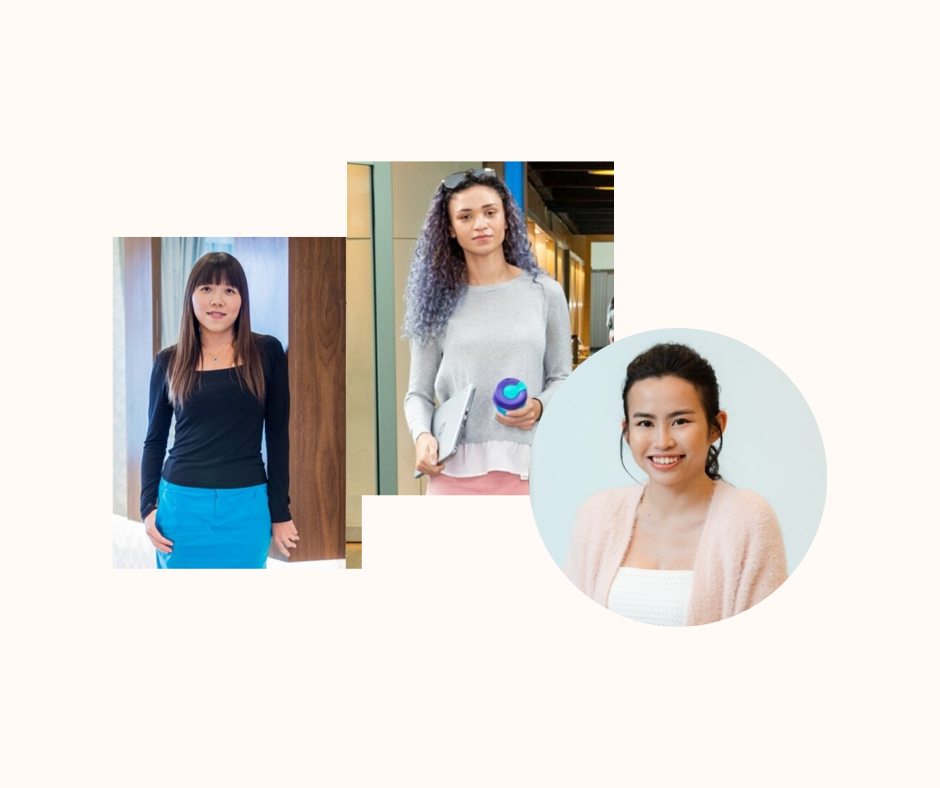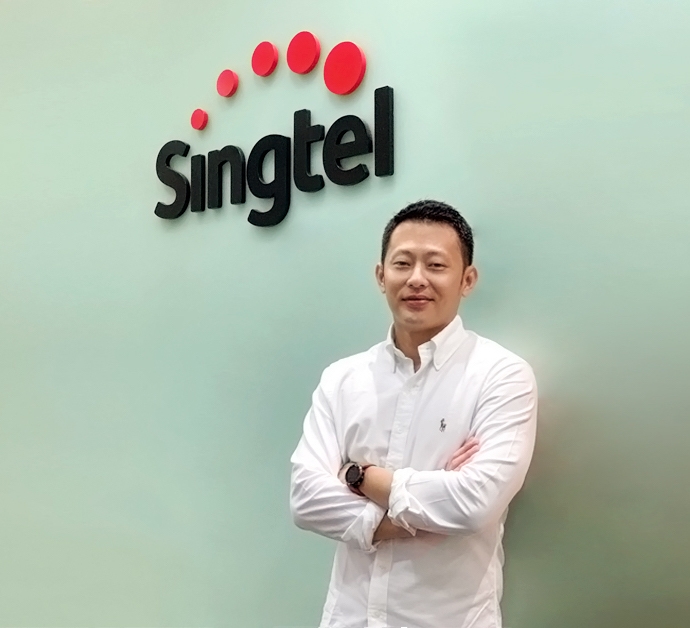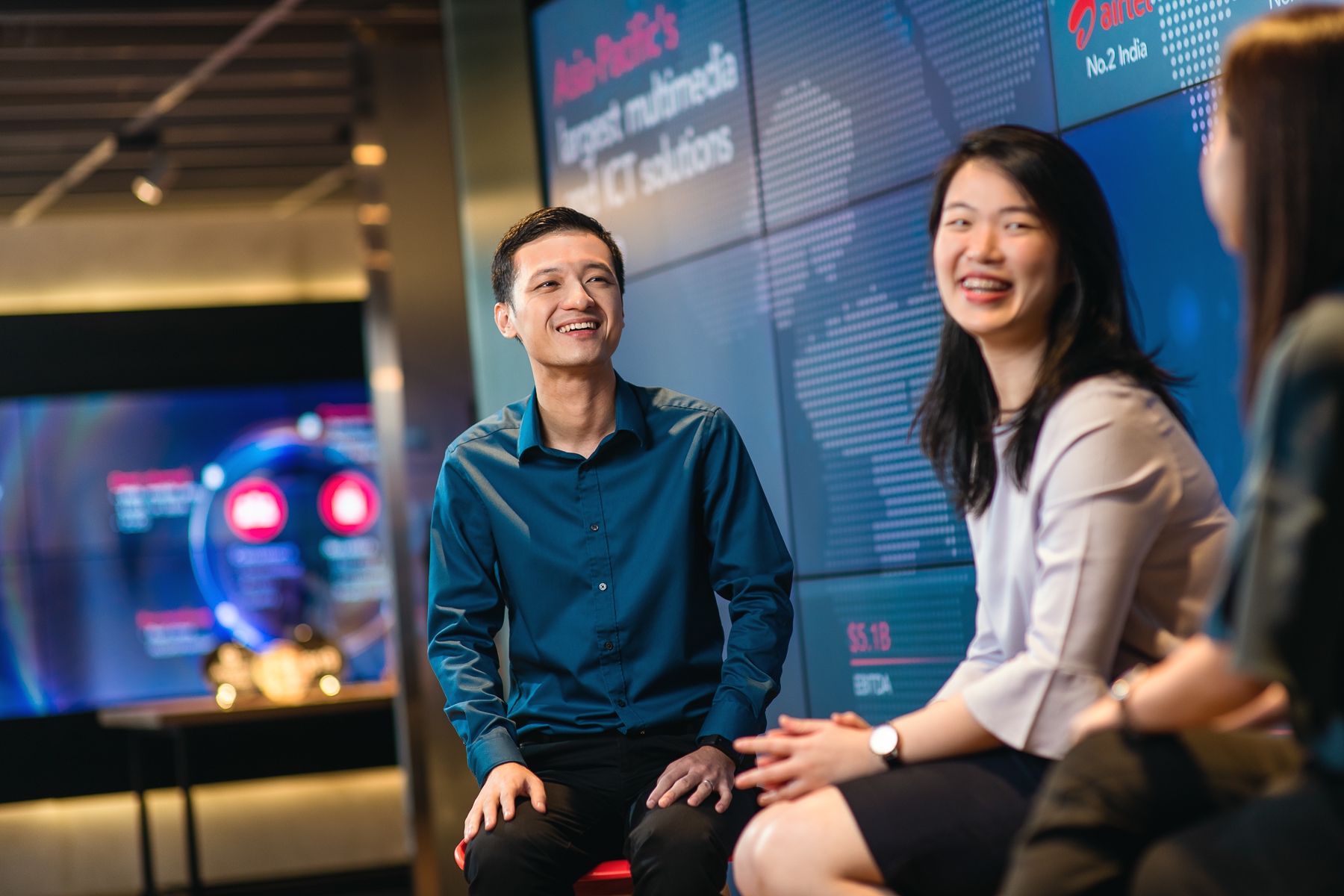Innovation, Diversity & Inclusion
Women who Power Engineering
Published 22 Jun 2020 by Claudia Nio

From L to R: Adeline Lee from Singtel, Isobel Fraser from Optus and Yingyu Xia from NCS.
To celebrate Women in Engineering Day this year, we speak to three female engineers from the Singtel Group on their career choices, their work experience in a traditionally male-dominated space and how they have carved a niche out for themselves doing what they enjoy.
While it may be so that women have been underrepresented in the Science, Technology, Engineering and Mathematics (STEM) industry, it is heartening to see that in recent years, there have been more female engineers rising up to break the preconceived masculinity attached to STEM.
We speak to Adeline Lee from Singtel, Isobel Fraser from Optus and Yingyu Xia from NCS.
What gets you excited to come to work every day?
Adeline: As Director of Mobile Access & Architecture at Singtel’s Technology Strategy & Transformation department under the Group Chief Technology Officer (GCTO) office, my work involves looking at adoption of new technology as part of the Group Networks strategic evolution and transformation.
Every day is interesting as I get to work on cutting edge technology like 5G, virtualisation, cloud, Edge computing and their adoption in various markets across the Group in locations such as Singapore and Australia. What is really satisfying is how we get to pull together business needs, match them with technology capabilities and finally see the delivery of new and innovative products and services for our customers.
Isobel: In my three years (and counting!) with Optus, there has never been a dull day. Cyber security is a hot and trending topic today, especially since more and more people are now going online for their work and play, and also relying on digital services and solutions for their everyday lives. As a Cyber Security Governance Coordinator in Optus’s Networks department, I work on cyber consulting, auditing, risk assessments and communications, and my role requires me to meet with a lot of people and collaborate with many teams across Optus and Singtel, to try and work on improving our cyber security network so that we protect our customers and businesses who use our services.
Yingyu: I am a software engineer with NCS’s Communications Engineering Department’s Video team and what I do is to use technology and innovation to solve everyday problems, such as coming up with solutions for queue management, mask detection and crowd counting. Knowing that my work brings benefits to our customers and helps our businesses brings a lot of meaning to the team.
How does it feel to be a female in the STEM industry that is largely dominated by men? Is it the case in your workplace?
Adeline: Admittedly, the proportion of female engineers is relatively lower than our male counterparts. I am proud to be one to debunk the myth that engineering and the telecommunications industry is only for “techy” men. Throughout my five years with Singtel, it has always been about collaboration and teamwork, regardless of gender and age. In fact, we leverage each other’s varied experiences, personalities and strengths for projects we work on together.
Singtel has done an excellent job in promoting workplace gender diversity at all levels (28% are female in Singtel’s middle and top management). In Networks, we also strive for female diversity among the engineering teams.
Isobel: It is a blessing that I am working in Optus and in an engineering role. I have never felt that I have been judged based on my gender. In fact, I use my position as a female engineer to push the gender diversity agenda even more! Right now, I am mentoring a high school girl under an Australian Business and Community Network (ABCN) programme called Focus. Optus partners ABCN, a non-profit organisation that aims to connect the business with lesser advantaged students through mentoring and partnership programmes. This is my way of encouraging and bringing in more female power to STEM.
Under the Singtel Group, the leadership has set the standard and created an environment that embraces gender diversity. We are lucky to have so many amazing women in leadership to look up to, such as Chua Sock Koong, Noleesha Hunt, Joelle Lim, Thong Siew Ling, Kelly Bayer Rosmarin and Aileen Tan.
What drove you to pursue an interest in the STEM fields?
Adeline: The STEM field has always intrigued me since young. As part of my undergraduate studies, I took an attachment in Singtel that piqued my interest further with the diverse opportunities in the company. I got to do what would typically be deemed as “a man’s job”, such as going to HDB rooftops for engineering site surveys and driving around in the Singtel van to optimise the mobile coverage. After graduation, I set my sights on a career as a female engineer in the telecommunications industry and I have stayed on for 15 years!
Isobel: There are some who might spend some time exploring their careers paths, and there are others who know from the get-go what they want to do, and that was me. I have known since eleventh grade that I wanted to work in the telecommunications field because I grew up hearing amazing stories from my best friend’s dad who has been working in Optus for many years.
What put me firmly on the telecommunications path was also learning that it was an Australian contribution that made our seamless connections that we take for granted, possible today - Macquarie University had helped create WiFi which is now in almost all households around the world. No prizes for guessing that I enrolled myself into Macquarie University, which is known for their Telecommunications major. Upon graduation, I undertook two internships before becoming a Graduate under Optus’s management associate programme, where I held roles in three different teams: Deployment Engineering, Project Management and Group Technology & Networks (GTN) Cyber Security. Upon completing my time as a Graduate, I remained in GTN Cyber Security, where I am now a Cyber Security Governance Coordinator.
Would you agree that there is more diversity in STEM now?
Yingyu: Undeniably, while there is still an imbalance in the industry, we are definitely seeing more females in STEM and balancing the scales! We all know now that STEM isn’t just for men – females are just as capable, intelligent and interested in STEM and we can hold our own in the industry. It is also heartening to see that there are more opportunities today for girls to be exposed to STEM at a younger age.
Adeline, Isobel and myself got ourselves into a science-based field because we know science can accommodate, and needs, a different perspective that females can bring. We know firmly the value we bring to the table, as thinkers, problem solvers and intellects. What’s more, a growing body of evidence shows that more diverse organisations enjoy greater creativity, stronger governance, better problem-solving skills and increased profitability.
To all our fellow female STEM warriors out there, we say join us!
Joining Us as a Female Engineer
As one of Asia's leading Telecommunications company, Singtel supports a gender-balanced workforce and offers equal opportunities in all aspects of employment. This is done through an increased focus on having women representation in senior leadership roles as well as key technical roles.
Singtel Women in Leadership Series is designed to build a durable pipeline of female talent, increase awareness and advocacy of equity goals across the Group, and provide women with networking, coaching and mentoring opportunities. We also have a partnership with the Australian programme, Females in IT & Telecommunications (FITT), through which we provide opportunities for our Optus female talents to be mentored by peers in the industry, and receive coaching support from a pool of internal and external coaches in leadership and career development.



